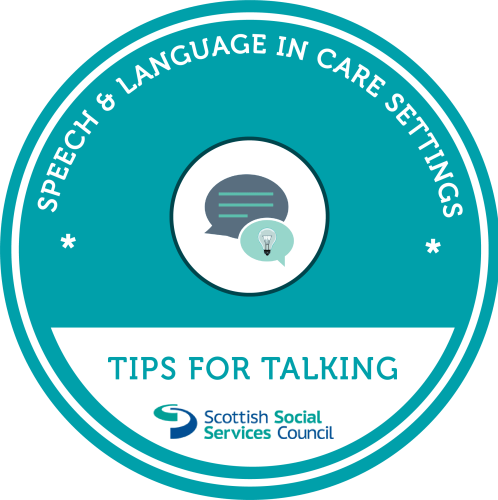
Apply for Go back
Speech and Language in Care Settings – Tips for Talking
Some acquired conditions such as stroke, head injury or dementia can make it difficult to think of words or understand what other people say.
Communication is vital in maintaining relationships and preventing social isolation. It is very important to find ways to enable people to participate in conversations and engage in social interaction even when talking is difficult.
This resource will give you tips to:
- Be aware of all the senses in communication
- Make use of visual materials and objects in conversations
- Enable people to make choices and join in
- Give people confidence in different situations
- Read the Tips for Talking leaflet. The leaflet is in a very easy to read format so you can share it with people who have language difficulties and look at some of the ideas together.
- Tell us three things you have learned and how you can implement this in your practice in a person centred way. Think about what difference will this make for the people you support?(150 words minimum)
- Discuss what you have learned with someone (e.g. line manager or colleague) and make a short note of this discussion. (50 words minimum).
Please add a note of your role (e.g. care home carer; unpaid carer; friend/family) and which healthboard/partnership you work or reside in.
Your application will be returned to you with a request for further evidence if it does not meet all the above criteria or if it is not clear which of these questions you are answering within your evidence.
Submit your application
I confirm that I have read, understood and completed all the activities listed in the badge criteria and that each question from the criteria is answered in the evidence I have provided. My evidence has been written or recorded by me and I have not copied it from anywhere or anyone else. I understand that it will take 28 days for you to assess my application and that feedback cannot be provided if my application is unsuccessful.
Your evidence, name, and email address will be sent to the organisation who issue this badge